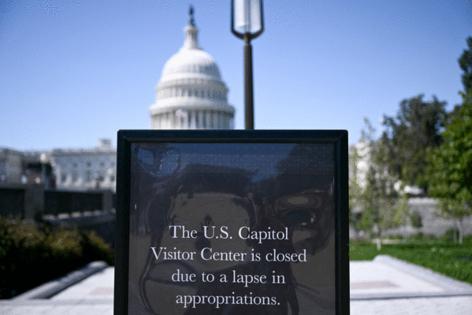After a shutdown, no 'A's for effort
Published in Political News
WASHINGTON — With the longest government shutdown in U.S. history now behind them, lawmakers aren’t rushing to give out any extra credit.
“An ‘I.’ Indecisive,” said Tennessee Republican Rep. Tim Burchett when asked how Congress’ recent performance would stack up on a report card.
“Is there a grade below ‘F’?” Wisconsin Democratic Rep. Mark Pocan said, pointing the finger at Republicans. “We’ve made ourselves pathetic and useless. I would say we flunk out.”
Lighting a cigar outside the Capitol, Texas Republican Rep. Troy Nehls took a different view.
“Everything’s working in this administration, everything’s working — and all Chuck Schumer was doing here was just trying to find a way to stop the momentum over the past 10 months,” Nehls said on Wednesday, before heading back inside to vote in favor of the spending deal that reopened the government.
“The witch is dead,” Nehls added of the Senate minority leader. “He lost this thing.”
The shutdown blame game is over, and now it’s time for the post-shutdown blame game. But as Congress attempts to get back to business, they’re also looking ahead — for one thing, the next funding deadline is approaching in just 11 weeks, with the stopgap measure set to expire Jan. 30.
And some hope the deadlock the nation has just endured will at least serve to highlight larger problems in Congress that need fixing.
“This year has been, without question, the most dysfunctional, useless year. In every level, this majority has no idea what they’re doing. They’ve given up all power to the executive branch. It is the most horrendous year in over 30 years of me being in government,” Pocan said. “But having said that, I think it also might help us to go back and change it and get functional again.”
Plenty of ideas
That will be easier said than done. While proposals to overhaul Congress are plentiful, few end up coming to fruition. And some worry the appetite for institutional change has only dwindled after the shutdown, as Democrats fume over Speaker Mike Johnson’s choice to keep the House dormant for much of the fall and delay seating a newly elected congresswoman.
One recent suggestion comes from Florida Rep. Jared Moskowitz, backed by 29 fellow Democrats. They want to require the House to convene and hold recorded quorum calls during a government shutdown, limit recesses and adjournment and punish lawmakers with fines if they fail to show up.
Dozens of other members have floated their own messaging bills tied to the shutdown, many aimed at docking members’ pay if they can’t meet funding deadlines. Congress hasn’t completed all its annual appropriations measures on time since back in the 1990s.
Others, like South Dakota Republican Rep. Dusty Johnson, propose automatically triggering a continuing resolution instead of shutting things down. His bill has picked up 12 co-sponsors, all Republicans.
Asked what lessons the funding lapse can provide about Congress as an institution, Rep. Stephanie Bice said, “We should have never been in a shutdown, I think, is the answer. I mean, we spent 42 days shutting down the government, and all for what? To have the exact same deal passed that we offered them six weeks ago.”
“There will be, I’m sure, lots of conversations around continuing resolutions and government shutdowns in the future, and how do we potentially avoid that?” added the Oklahoma Republican, who chairs the House Administration Modernization and Innovation Subcommittee.
While many of the proposals introduced during the shutdown were largely messaging exercises, other efforts in recent years have taken a longer, harder look at Congress’ problems. Bice’s subcommittee, for instance, stems from a temporary select committee launched in the 116th Congress that issued more than 200 recommendations to modernize the institution, including some aimed at revamping the budget process or boosting civility.
Supporters tout progress on more than half of those recommendations, but others would require sweeping legislative changes that seem even more unlikely in the current climate.
Sending a message
As Congress continues to point fingers over the shutdown, it’s not getting a passing grade from the American people, either. A poll from Gallup conducted during the first half of October found that Americans’ approval rating of Congress had declined by 11 points to 15%. Nearly 4 in 5 U.S. adults disapprove.
But some hope the last several weeks served a larger purpose, even so. For Democrats, much of the point was making a stand on enhanced Affordable Care Act tax credits, whose expiration will be felt in the form of higher premiums for many Americans.
Asked what lessons could be learned, Rep. Jasmine Crockett pointed to policy and cost-of-living questions she wants to see in the spotlight.
“The idea that we are arguing about whether or not people get … $6 a day to eat, but we’re not debating the fact that Elon Musk gets $8 million a day — we need to talk about what real welfare looks like in this country,” she said.
The Texas Democrat has become a key voice as her party works to move past its messaging struggles and look ahead to the midterms next year.
“One of the things that the Democrats did, that a lot of people say that we don’t typically do well, is we communicated out. Everyone understood what we were fighting for,” she said. “Unfortunately, folding without getting what it is that we say we were fighting for makes it look like this is a problem.”
©2025 CQ-Roll Call, Inc., All Rights Reserved. Visit cqrollcall.com. Distributed by Tribune Content Agency, LLC.
























































Comments